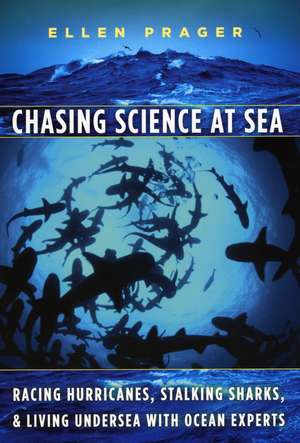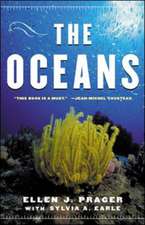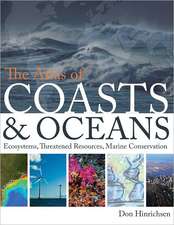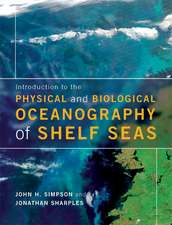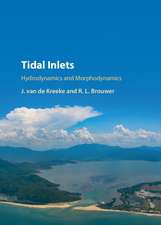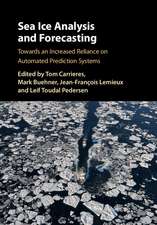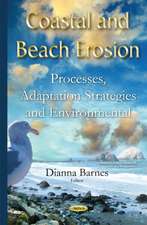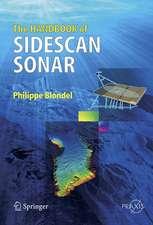Chasing Science at Sea: Racing Hurricanes, Stalking Sharks, and Living Undersea with Ocean Experts
Autor Ellen Prageren Limba Engleză Paperback – 15 iun 2010
To the average office-dweller, marine scientists seem to have the good life: cruising at sea for weeks at a time, swimming in warm coastal waters, living in tropical paradises. But ocean scientists who go to sea will tell you that it is no vacation. Creature comforts are few and the obstacles seemingly insurmountable, yet an abundance of wonder and discovery still awaits those who take to the ocean. Chasing Science at Sea immerses readers in the world of those who regularly go to sea—aquanauts living underwater, marine biologists seeking unseen life in the deep ocean, and the tall-ship captains at the helm, among others—and tells the fascinating tale of what life—and science—is like at the mercy of Mother Nature.
With passion and wit, well-known marine scientist Ellen Prager shares her stories as well as those of her colleagues, revealing that in the field ingenuity and a good sense of humor are as essential as water, sunblock, and GPS. Serendipity is invaluable, and while collecting data is the goal, sometimes just getting back to shore means success. But despite the physical hardship and emotional duress that come with the work, optimism and adventure prompt a particularly hardy species of scientist to return again and again to the sea.
Filled with firsthand accounts of the challenges and triumphs of dealing with the extreme forces of nature and the unpredictable world of the ocean, Chasing Science at Sea is a unique glimpse below the water line at what it is like and why it is important to study, explore, and spend time in one of our planet’s most fascinating and foreign environments.
Preț: 144.56 lei
Nou
Puncte Express: 217
Preț estimativ în valută:
27.66€ • 28.88$ • 22.89£
27.66€ • 28.88$ • 22.89£
Carte tipărită la comandă
Livrare economică 04-18 aprilie
Preluare comenzi: 021 569.72.76
Specificații
ISBN-13: 9780226678740
ISBN-10: 0226678741
Pagini: 196
Ilustrații: 4 color plates, 28 halftones
Dimensiuni: 152 x 229 x 23 mm
Greutate: 0.28 kg
Editura: University of Chicago Press
Colecția University of Chicago Press
ISBN-10: 0226678741
Pagini: 196
Ilustrații: 4 color plates, 28 halftones
Dimensiuni: 152 x 229 x 23 mm
Greutate: 0.28 kg
Editura: University of Chicago Press
Colecția University of Chicago Press
Cuprins
A Note on the Title
1. The Invisible Crowd
2. Mega-Slime, Seduction, and Shape-Shifting
3. Let’s Talk Snails
4. The Riddle of the Reef
5. Armed and Dangerous
6. Cabinet of Curiosities
7. X-Games
8. Radical Living
9. Danger Looms
10. The Good News
11. How You Can Help
Bibliography
Acknowledgments
Sponsors and Partnering Organizations
1. The Invisible Crowd
2. Mega-Slime, Seduction, and Shape-Shifting
3. Let’s Talk Snails
4. The Riddle of the Reef
5. Armed and Dangerous
6. Cabinet of Curiosities
7. X-Games
8. Radical Living
9. Danger Looms
10. The Good News
11. How You Can Help
Bibliography
Acknowledgments
Sponsors and Partnering Organizations
Recenzii
"The sea has always inspired tales of adventure and discovery in the face of a vast, unpredictable unknown. Prager, chief scientist at the undersea research station Aquarius Reef Base, in the Florida Keys, uses adventure to frame this collection of firsthand accounts about the challenges faced by marine scientists. But adventure is a far cry from glamour: research often means close quarters on a small ship, usually with bad food, infrequent showers and changeable weather, as well as long days of collecting data. With tongue only slightly in cheek, Prager offers advice for any field scientist: always bring spare pencils and be prepared for things to go wrong, from pirates to valuable equipment getting lost or damaged. In exchange, scientists look forward to the sense-of-wonder moments: swimming with whale sharks, seeing St. Elmo's Fire dance along the rigging. Focused on adventure rather than in-depth science, this entertaining book will appeal most to casual and younger readers."
“‘Going into the field is an exciting, challenging, and inspiring part of doing ocean science; it is also essential,’ writes Prager, currently chief scientist of the undersea research station Aquarius Reef Base. Using anecdotes from colleagues and from her own career, she succeeds in showing the reader that doing science can be both fun and thrilling, especially when it involves work in and on the ocean. She also reminds us that field research is important to doing good science and that learning more about the world’s oceans is essential to our future.”
“In Chasing Science at Sea, Ellen Prager tells amazing stories about her experiences on the water, as well as those of other researchers who have dared face its known and unknown dangers. Through these tales, and from the passion with which she writes about the creatures of the sea, the reader will understand how important the oceans are to our lives.”
“Dr. Prager’s book captures the thrilling personal and professional experiences of being at sea and observing how the ocean works firsthand. Oceanography is a contact science, so it is essential to be out there to understand what is going on in this fast-changing, dynamic environment. Her collection of experiences does an excellent job visualizing the excitement of ocean exploration and discovery. It brought back many fond memories and is just delightful to read.”
"Thank you, Ellen Prager, for your salute to the ocean and the wild and wonderful people who explore the sea. I laughed out loud while absorbing serious insights about the state of the ocean and what it really takes for scientists to extract deep knowledge from the deep blue. Science fiction is really tame compared to the reality you have captured in this saga of ocean science.”
"Prager, chief scientist of the world's only undersea station, in Florida, presents a well-organized introduction to marine science enlivened by the story of her own personal path into the profession. Through dozens of anecdotes of wave scientists, marine geologists, tsunami researchers, underwater archaeologists, and many others, Prager casually reveals the vast number and variety of interests pursued in the sea. She speaks to one expert about tumor viruses affecting undersea creatures and another whose specialty is bioluminescence. Everyone has a story of discovery to share, and Prager's ability to zero in on astonishing facts makes for an enormously appealing book. The heavy emphasis on fieldwork allows scientists to stress the more exciting aspects of the professions (from watching whale sharks feed to skirting the edges of a hurricane). As an unorthodox handbook for would-be ocean scientists, this title is invaluable. Pair it with William Sargent's Writing Naturally (2006) to reveal the way to a personally fulfilling scientific career."
"Ellen Prager’s new book, Chasing Science at Sea, is a personal account of why fieldwork is so important in many areas of ocean science, and how exciting that fieldwork can be. Prager has interwoven her own story of studying carbonates at the interface between biology and geology with stories from friends and colleagues. Storm stories and up-close-and-personal encounters with ocean creatures such as reef squid, marine iguanas, and whales abound. Throughout the book, she emphasizes the idea that the combination of observations and serendipity plays a critical role in science, and she gives examples of where this combination has led to especially important discoveries. . . .
Readers will enjoy the sea stories, personal reminiscences, and enthusiasm that permeate this book. In addition, this book should be very popular with young and future scientists who want a taste of what oceanography can be like."
"[Prager's] book brings alive the moments of wonder, surprise, enlightenment, frustration, humour, camaraderie and danger involved in fieldwork on and beneath the waves.... Her book assembles anecdotes from colleagues such as marine biologists, geologists and engineers. Their tales range from divers chasing parrotfish poo with plastic bags to oceanographers seeing an actual step in the surface of the sea at the edge of the Gulf Stream. In bringing these briny tales together, Prager explores some of their common themes to convey why many of us study the ocean—and why it matters."
"Written in a welcoming, conversational tone, the book not only entertains but delivers some important lessons that will prove useful to any student considering a career in field research. At the core of these lessons is the idea that working at sea can be rewarding, but it's far from glamorous....Highly recommended."
"[Prager's] highly readable stories show the human side of scientists as well as the challenges of conducting research on the high sea, in the deep ocean, or near to shore....Prager’s flair for story-telling, even when the stories aren’t her own but those of colleagues, makes the book an enjoyable read. Her tales have certainly made me appreciate even more my own career in ocean science research and education."
"Ellen Prager’s delightful and engrossing book, Chasing Science at Sea, is a compilation of hundreds of field stories from marine scientists of all disciplines. They are woven together with interesting facts, descriptions of various field activities, and the lessons learned from setbacks to create a rich and multifaceted portrayal of the world of marine field research. But the purpose of these stories is more than just to entertain. As ocean science has become increasingly dependent on remote technologies, fieldwork has become harder to fund, less prevalent, and more difficult to undertake. Ellen Prager’s hope is that these stories will illustrate the value of fieldwork, inspire the next generation of students to a renewed commitment to field-based research, and help preserve some of the history and experiences of modern marine scientists. . . . . Chasing Science at Sea truly succeeds in communicating the challenges, excitement, and sheer fun of marine science in a way that is accessible to all."
